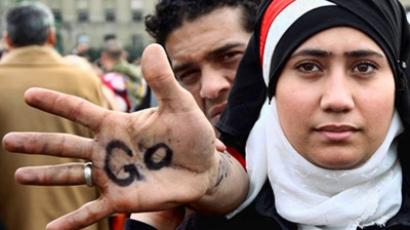Gloomy economic forecast puts Egypt in the doldrums
More than a year after the revolution in Egypt, high hopes of a better life for everyone have faded with its faltering economy. Expectations for the civilian rulers who will take over in June are high, but the cost of failure may be higher.
The declared transition to democracy is a messy process in Egypt. Despite the public’s great expectations, living conditions for the average Egyptians remain poor in the wake of the revolution. With a $515.4 billion GDP in 2011, the country is ranked 27th in the world. But in reality, Egypt could hardly be called a wealthy nation, with per capita GDP at only $6,500, which repels the country to the 133rd spot. Unemployment is unofficially at 12.2 per cent, with some saying the figure could be twice as high, especially among the young. Put that against a backdrop of 13.3 per cent inflation, and the overall picture seems pretty bleak indeed. With nearly a half of Egypt’s 80 million people hovering at the poverty line ($2 a day per person as defined by the World Bank), public discontent and unceasing protests are only natural.The situation in Egypt remains combustive, and if neither the ruling military nor the civil government changes the situation for the better – and soon – a new explosion of public outrage appears to be highly probable.
Revolution hit small businesses in Cairo
The revolution essentially happened on Tahrir Square in Cairo. Like it or not, small business owners on the adjacent streets were inevitably plunged right in the middle of the political turmoil, witnessing everything with their own eyes. The part of Cairo surrounding Tahrir is the financial and tourist hub of the city. But after the revolution, with protests sporadically breaking out every now and then, the shopkeepers there have found their lives shattered, and their livelihoods threatened.The repair and clean-up efforts following the protesters' clashes with police brought many businesses to a halt, further denting their already small incomes. “After the revolution, there has been less work. Because of all these events, we shut down early and go home, because there's no business,” cafe owner Samir told RT's Irina Galushko. “We had to stay closed for several days immediately following the uprising on January 25th last year,” he remembers.
Poverty instigates larceny
The security situation in the Egyptian capital remains uneasy. In fact, many residents say right now it's even worse than it was at the height of the uprising last year. Yet, most Egyptians believe the main problem is not the mess which followed the protests, but the absence of jobs, which has turned many desperate people into looters. “One in every two people you meet in the street under the age of 25 doesn't work. And this is a potential for trouble,” warns Moatamer Amin, political activist and writer.It was the country's flailing economy which forced thousands out on Tahrir square in the first place.“The first slogans there were ‘bread’, because the situation here was actually very bad. People were killing each in the lines to get bread,” Moatamer Amin said.The angry unemployed youth often choose to sweep in after the protesters, looting and stealing from damaged shops. Cafe owner Samir recalls that “They broke everything we had here. Other businesses in the neighborhood were also looted. All houses on this street and near Tahrir were either broken into or robbed. Everyone suffered.”In an attempt to keep the protests under control, the government installed cement walls, blocking off the area around the Tahrir square.It may have made things easier for the police, but it's only made matters worse for locals.Another cafe owner, Mohammed said “the barricades they built on these streets, they have really affected us, as well as the huge protests. We haven't worked for seven days after those and afterwards had to clean up a lot.”It was hoped the revolution would turn the suffering of the Egyptian populace around, bringing more jobs to people and putting food on their tables.But as things stand, more than a year after the uprising, even those who did have a livelihood are now struggling to stay afloat.














